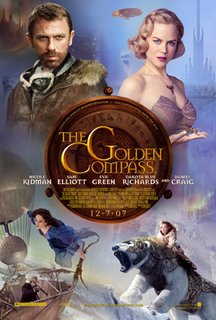
In reviewing
The Golden Compass, I will not mention the controversy surrounding the film, nor will I talk about its religious views. The reason for this? All material related to religion in the story has been edited out of the adaptation, in an attempt to bring in a wider audience, and so as not to offend anyone. I will instead focus on a much bigger issue at hand. The issue, I feel, is not the views of the story or the original author, rather it is that
The Golden Compass is not a very good movie. Oh, I have no doubt that the stories that inspired them have their entertainment value, as there are some good ideas lurking under the surface. The problem here is that writer-director Chris Weitz (
American Pie,
About a Boy) has made a film that is told in such an episodic and choppy manner that it's bound to confuse and frustrate anyone not familiar with the fantasy world created in the books by Philip Pullman.
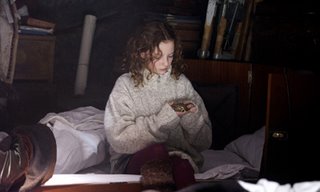 The Golden Compass
The Golden Compass is set in a world similar to our own, but apparently is populated by various races that include humans, talking polar bears (called Ice Bears in this story), witches, and various other people that are hinted at, but never really developed to any degree. The people in this world are linked with Daemons, animals that reflect and represent their souls, and are their closest companions. These are definitely intriguing ideas for a fantasy adventure, but Weitz fails to truly dig into these ideas. He keeps us at arm's length the entire time. There's also something called Dust, which apparently is the key to unlocking other alternate worlds, and plays a major part in a war that is brewing between the people of the world, and an oppressive society that controls the world with an iron fist known as The Magisterium. The film's explanation of Dust and The Magisterium itself is vague at best. We only learn what precious little we need to move the story along, and then it just leaves it at that. Nothing is developed beyond the bare essentials, not even the characters, and I quickly found myself irritated by Weitz's shaky and underdeveloped screenplay.
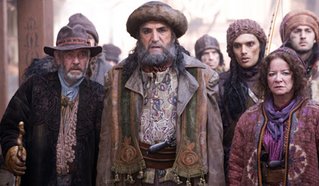
But, I'm getting ahead of myself. The story at hand is that a precocious and feisty young girl named Lyra (newcomer Dakota Blue Richards) resides at a private school with her friends, and her Daemon Pan (voice by Freddy Highmore), who is constantly shape shifting into different animal forms, as he has not yet figured out the most appropriate form to represent Lyra's inner soul. Lyra's Uncle is an explorer named Lord Asrial (Daniel Craig), and he has discovered what he believes to be a gateway to other worlds somewhere up in the North. The evil representatives of The Magisterium try to halt his journey, but they are not successful. Instead, they decide to go after Lyra, and send a woman named Marisa Coulter (Nicole Kidman) to befriend the girl, hoping to gain her trust. Lyra and Pan, doing some investigating of their own, discover that Marisa has ties to an evil organization that are kidnaping children and forcefully separating them from their Daemons through technology. Lyra escapes, and finds herself snatched up by a band of rebels who are trying to rise up against the oppressive Magisterium, and rescue their children who have been captured by them. Lyra's journey to find her Uncle and discover the truth about the world will take her far to the northern arctic, where she will have to rely on the aid of her new friends and an exiled Ice Bear named Iorek Bymison (voice by Ian McKellen) to discover her destiny.
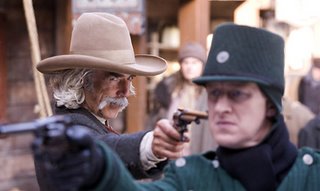
With a running time of just under two hours, watching
The Golden Compass is a lot like getting all of the major details of the story, without getting anything in between. The movie hits all the right notes, but doesn't know how to bring them together. We're constantly enticed with wonderful sights and ideas, but the movie speeds right past them almost as soon as they're introduced. We never feel any connection to the story or to the world itself, not in the way we did in other recent fantasy epics like
Harry Potter or
Lord of the Rings. Those films take their time, let us understand the world and its rules, and lets us get attached to the characters and their plights. This movie speeds right through like a runaway train, never slowing down, so that when the end credits show up, they not only feel like they've come way too soon, they feel like the movie has stopped just as the story was about to begin. I understand that this is intended to be an introduction, and that there are more movies on the way should this film have a big opening weekend (which it surely will). But at the same time, this film is supposed to get us involved in the world and the characters. It didn't do this for me. The world was disappointingly kept in mystery, as we get to see so little of it. And what we do see resembles either our world, or places we've seen in other fantasy worlds depicted in films. Nothing excited me, and the areas Lyra does explore hold a curious lack of imagination and wonder. If you're going to show us a kingdom of talking warrior polar bears, show us the kingdom, not just some glaciers and a throne room that looked dull and mundane.
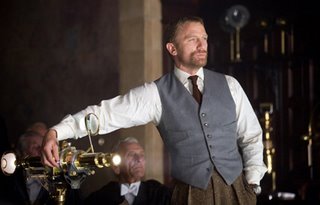
More than the film's lack of wonder and speedy pace, it is the characters that ultimately disappointed me. Nobody comes across as being interesting, because the movie is far too interested in moving the story along to stop long enough to make us care about them. Young Lyra is plucky and spirited, but that's really all we ever learn about her. She never comes across as a genuine character in this movie, she's just to act as a tool to move from Point A to Point B in the story. The evil Marisa Coulter, and indeed The Magisterium itself, is especially disappointing, as they never come across as a real threat. They lurk about, talking about oppressing the people and destroying all free will in the world, but they never actually act upon their actions. In her performance as Marisa, Nicole Kidman is supposed to come across as icy and easy to despise. But because the movie barely touches upon her character (indeed, her character is so underdeveloped, she barely plays a role in the story itself, and almost comes across as a cameo), I never became involved with her or her evil plans for Lyra. The movie keeps on throwing characters and conflicts that, in a fleshed out film, would be interesting. But here, they are shallow and empty. Iorek the Ice Bear has a tragic story where he was exiled from his own kingdom. When he returns to his kingdom, the sequence holds absolutely no drama or suspense. It is just a three minute sequence that is forgotten about and never even mentioned again afterward.
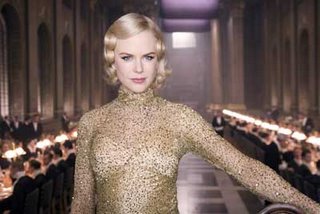
I really think the film's central problem is that writer-director Chris Weitz is not the right man to be telling this story. It's not just the fact that he has absolutely no experience helming a big budget special effects story, and sometimes seems overwhelmed at the task at hand. It's that he handles the story in such a dry manor. You get the sense watching the film that he flipped through the pages of the book, made a checklist of every scene he wanted to include, and then wrote his screenplay based solely on this checklist. This causes the scenes to not flow together. Each scene is a major event, but there is nothing in between to lead us from one event to the next. This causes everything in the movie to suffer. The performers are forced to stand around, move the plot along in their dialogue, and wait for the big climactic battle scene. And when the battles do come, they are disappointing, thanks to the somewhat flat and uninspired direction of Weitz. Even the special effects are inconsistent. Computer animation is used heavily throughout
The Golden Compass to bring its large talking animal cast to life. And although many of the effects are good, some of them (such as the evil monkey Daemon who follows around Kidman's character) look no better than the stuff you see in a recent Playstation or Xbox game. The animals are voiced by some celebrities, but you wonder why the filmmakers bothered, since aside from Highmore's Pan and McKellen's Iorek, none of them have much dialogue.
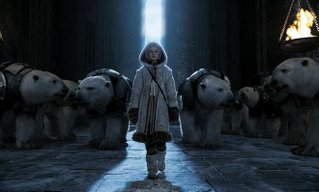
In their advertising campaign, New Line Cinema has made the not-very-subtle suggestion that
The Golden Compass is likely to join their
Lord of the Rings film trilogy as the next great fantasy epic. While this certainly isn't a complete disaster like last year's
Eragon, this is still far from the lofty heights the studio would like to compare it to. Should this movie make enough money to ensure the story continues, I hope they put someone else behind the camera, and I hope that they actually take the time to explore the world and the characters. I was intrigued early on, but that was quickly replaced with frustration when I discovered the movie didn't even want to tell its own story. For the sake of this potential franchise, I hope this treatment will not become the norm in further sequels.
2 comments
 In reviewing The Golden Compass, I will not mention the controversy surrounding the film, nor will I talk about its religious views. The reason for this? All material related to religion in the story has been edited out of the adaptation, in an attempt to bring in a wider audience, and so as not to offend anyone. I will instead focus on a much bigger issue at hand. The issue, I feel, is not the views of the story or the original author, rather it is that The Golden Compass is not a very good movie. Oh, I have no doubt that the stories that inspired them have their entertainment value, as there are some good ideas lurking under the surface. The problem here is that writer-director Chris Weitz (American Pie, About a Boy) has made a film that is told in such an episodic and choppy manner that it's bound to confuse and frustrate anyone not familiar with the fantasy world created in the books by Philip Pullman.
In reviewing The Golden Compass, I will not mention the controversy surrounding the film, nor will I talk about its religious views. The reason for this? All material related to religion in the story has been edited out of the adaptation, in an attempt to bring in a wider audience, and so as not to offend anyone. I will instead focus on a much bigger issue at hand. The issue, I feel, is not the views of the story or the original author, rather it is that The Golden Compass is not a very good movie. Oh, I have no doubt that the stories that inspired them have their entertainment value, as there are some good ideas lurking under the surface. The problem here is that writer-director Chris Weitz (American Pie, About a Boy) has made a film that is told in such an episodic and choppy manner that it's bound to confuse and frustrate anyone not familiar with the fantasy world created in the books by Philip Pullman. The Golden Compass is set in a world similar to our own, but apparently is populated by various races that include humans, talking polar bears (called Ice Bears in this story), witches, and various other people that are hinted at, but never really developed to any degree. The people in this world are linked with Daemons, animals that reflect and represent their souls, and are their closest companions. These are definitely intriguing ideas for a fantasy adventure, but Weitz fails to truly dig into these ideas. He keeps us at arm's length the entire time. There's also something called Dust, which apparently is the key to unlocking other alternate worlds, and plays a major part in a war that is brewing between the people of the world, and an oppressive society that controls the world with an iron fist known as The Magisterium. The film's explanation of Dust and The Magisterium itself is vague at best. We only learn what precious little we need to move the story along, and then it just leaves it at that. Nothing is developed beyond the bare essentials, not even the characters, and I quickly found myself irritated by Weitz's shaky and underdeveloped screenplay.
The Golden Compass is set in a world similar to our own, but apparently is populated by various races that include humans, talking polar bears (called Ice Bears in this story), witches, and various other people that are hinted at, but never really developed to any degree. The people in this world are linked with Daemons, animals that reflect and represent their souls, and are their closest companions. These are definitely intriguing ideas for a fantasy adventure, but Weitz fails to truly dig into these ideas. He keeps us at arm's length the entire time. There's also something called Dust, which apparently is the key to unlocking other alternate worlds, and plays a major part in a war that is brewing between the people of the world, and an oppressive society that controls the world with an iron fist known as The Magisterium. The film's explanation of Dust and The Magisterium itself is vague at best. We only learn what precious little we need to move the story along, and then it just leaves it at that. Nothing is developed beyond the bare essentials, not even the characters, and I quickly found myself irritated by Weitz's shaky and underdeveloped screenplay. But, I'm getting ahead of myself. The story at hand is that a precocious and feisty young girl named Lyra (newcomer Dakota Blue Richards) resides at a private school with her friends, and her Daemon Pan (voice by Freddy Highmore), who is constantly shape shifting into different animal forms, as he has not yet figured out the most appropriate form to represent Lyra's inner soul. Lyra's Uncle is an explorer named Lord Asrial (Daniel Craig), and he has discovered what he believes to be a gateway to other worlds somewhere up in the North. The evil representatives of The Magisterium try to halt his journey, but they are not successful. Instead, they decide to go after Lyra, and send a woman named Marisa Coulter (Nicole Kidman) to befriend the girl, hoping to gain her trust. Lyra and Pan, doing some investigating of their own, discover that Marisa has ties to an evil organization that are kidnaping children and forcefully separating them from their Daemons through technology. Lyra escapes, and finds herself snatched up by a band of rebels who are trying to rise up against the oppressive Magisterium, and rescue their children who have been captured by them. Lyra's journey to find her Uncle and discover the truth about the world will take her far to the northern arctic, where she will have to rely on the aid of her new friends and an exiled Ice Bear named Iorek Bymison (voice by Ian McKellen) to discover her destiny.
But, I'm getting ahead of myself. The story at hand is that a precocious and feisty young girl named Lyra (newcomer Dakota Blue Richards) resides at a private school with her friends, and her Daemon Pan (voice by Freddy Highmore), who is constantly shape shifting into different animal forms, as he has not yet figured out the most appropriate form to represent Lyra's inner soul. Lyra's Uncle is an explorer named Lord Asrial (Daniel Craig), and he has discovered what he believes to be a gateway to other worlds somewhere up in the North. The evil representatives of The Magisterium try to halt his journey, but they are not successful. Instead, they decide to go after Lyra, and send a woman named Marisa Coulter (Nicole Kidman) to befriend the girl, hoping to gain her trust. Lyra and Pan, doing some investigating of their own, discover that Marisa has ties to an evil organization that are kidnaping children and forcefully separating them from their Daemons through technology. Lyra escapes, and finds herself snatched up by a band of rebels who are trying to rise up against the oppressive Magisterium, and rescue their children who have been captured by them. Lyra's journey to find her Uncle and discover the truth about the world will take her far to the northern arctic, where she will have to rely on the aid of her new friends and an exiled Ice Bear named Iorek Bymison (voice by Ian McKellen) to discover her destiny. With a running time of just under two hours, watching The Golden Compass is a lot like getting all of the major details of the story, without getting anything in between. The movie hits all the right notes, but doesn't know how to bring them together. We're constantly enticed with wonderful sights and ideas, but the movie speeds right past them almost as soon as they're introduced. We never feel any connection to the story or to the world itself, not in the way we did in other recent fantasy epics like Harry Potter or Lord of the Rings. Those films take their time, let us understand the world and its rules, and lets us get attached to the characters and their plights. This movie speeds right through like a runaway train, never slowing down, so that when the end credits show up, they not only feel like they've come way too soon, they feel like the movie has stopped just as the story was about to begin. I understand that this is intended to be an introduction, and that there are more movies on the way should this film have a big opening weekend (which it surely will). But at the same time, this film is supposed to get us involved in the world and the characters. It didn't do this for me. The world was disappointingly kept in mystery, as we get to see so little of it. And what we do see resembles either our world, or places we've seen in other fantasy worlds depicted in films. Nothing excited me, and the areas Lyra does explore hold a curious lack of imagination and wonder. If you're going to show us a kingdom of talking warrior polar bears, show us the kingdom, not just some glaciers and a throne room that looked dull and mundane.
With a running time of just under two hours, watching The Golden Compass is a lot like getting all of the major details of the story, without getting anything in between. The movie hits all the right notes, but doesn't know how to bring them together. We're constantly enticed with wonderful sights and ideas, but the movie speeds right past them almost as soon as they're introduced. We never feel any connection to the story or to the world itself, not in the way we did in other recent fantasy epics like Harry Potter or Lord of the Rings. Those films take their time, let us understand the world and its rules, and lets us get attached to the characters and their plights. This movie speeds right through like a runaway train, never slowing down, so that when the end credits show up, they not only feel like they've come way too soon, they feel like the movie has stopped just as the story was about to begin. I understand that this is intended to be an introduction, and that there are more movies on the way should this film have a big opening weekend (which it surely will). But at the same time, this film is supposed to get us involved in the world and the characters. It didn't do this for me. The world was disappointingly kept in mystery, as we get to see so little of it. And what we do see resembles either our world, or places we've seen in other fantasy worlds depicted in films. Nothing excited me, and the areas Lyra does explore hold a curious lack of imagination and wonder. If you're going to show us a kingdom of talking warrior polar bears, show us the kingdom, not just some glaciers and a throne room that looked dull and mundane. More than the film's lack of wonder and speedy pace, it is the characters that ultimately disappointed me. Nobody comes across as being interesting, because the movie is far too interested in moving the story along to stop long enough to make us care about them. Young Lyra is plucky and spirited, but that's really all we ever learn about her. She never comes across as a genuine character in this movie, she's just to act as a tool to move from Point A to Point B in the story. The evil Marisa Coulter, and indeed The Magisterium itself, is especially disappointing, as they never come across as a real threat. They lurk about, talking about oppressing the people and destroying all free will in the world, but they never actually act upon their actions. In her performance as Marisa, Nicole Kidman is supposed to come across as icy and easy to despise. But because the movie barely touches upon her character (indeed, her character is so underdeveloped, she barely plays a role in the story itself, and almost comes across as a cameo), I never became involved with her or her evil plans for Lyra. The movie keeps on throwing characters and conflicts that, in a fleshed out film, would be interesting. But here, they are shallow and empty. Iorek the Ice Bear has a tragic story where he was exiled from his own kingdom. When he returns to his kingdom, the sequence holds absolutely no drama or suspense. It is just a three minute sequence that is forgotten about and never even mentioned again afterward.
More than the film's lack of wonder and speedy pace, it is the characters that ultimately disappointed me. Nobody comes across as being interesting, because the movie is far too interested in moving the story along to stop long enough to make us care about them. Young Lyra is plucky and spirited, but that's really all we ever learn about her. She never comes across as a genuine character in this movie, she's just to act as a tool to move from Point A to Point B in the story. The evil Marisa Coulter, and indeed The Magisterium itself, is especially disappointing, as they never come across as a real threat. They lurk about, talking about oppressing the people and destroying all free will in the world, but they never actually act upon their actions. In her performance as Marisa, Nicole Kidman is supposed to come across as icy and easy to despise. But because the movie barely touches upon her character (indeed, her character is so underdeveloped, she barely plays a role in the story itself, and almost comes across as a cameo), I never became involved with her or her evil plans for Lyra. The movie keeps on throwing characters and conflicts that, in a fleshed out film, would be interesting. But here, they are shallow and empty. Iorek the Ice Bear has a tragic story where he was exiled from his own kingdom. When he returns to his kingdom, the sequence holds absolutely no drama or suspense. It is just a three minute sequence that is forgotten about and never even mentioned again afterward. I really think the film's central problem is that writer-director Chris Weitz is not the right man to be telling this story. It's not just the fact that he has absolutely no experience helming a big budget special effects story, and sometimes seems overwhelmed at the task at hand. It's that he handles the story in such a dry manor. You get the sense watching the film that he flipped through the pages of the book, made a checklist of every scene he wanted to include, and then wrote his screenplay based solely on this checklist. This causes the scenes to not flow together. Each scene is a major event, but there is nothing in between to lead us from one event to the next. This causes everything in the movie to suffer. The performers are forced to stand around, move the plot along in their dialogue, and wait for the big climactic battle scene. And when the battles do come, they are disappointing, thanks to the somewhat flat and uninspired direction of Weitz. Even the special effects are inconsistent. Computer animation is used heavily throughout The Golden Compass to bring its large talking animal cast to life. And although many of the effects are good, some of them (such as the evil monkey Daemon who follows around Kidman's character) look no better than the stuff you see in a recent Playstation or Xbox game. The animals are voiced by some celebrities, but you wonder why the filmmakers bothered, since aside from Highmore's Pan and McKellen's Iorek, none of them have much dialogue.
I really think the film's central problem is that writer-director Chris Weitz is not the right man to be telling this story. It's not just the fact that he has absolutely no experience helming a big budget special effects story, and sometimes seems overwhelmed at the task at hand. It's that he handles the story in such a dry manor. You get the sense watching the film that he flipped through the pages of the book, made a checklist of every scene he wanted to include, and then wrote his screenplay based solely on this checklist. This causes the scenes to not flow together. Each scene is a major event, but there is nothing in between to lead us from one event to the next. This causes everything in the movie to suffer. The performers are forced to stand around, move the plot along in their dialogue, and wait for the big climactic battle scene. And when the battles do come, they are disappointing, thanks to the somewhat flat and uninspired direction of Weitz. Even the special effects are inconsistent. Computer animation is used heavily throughout The Golden Compass to bring its large talking animal cast to life. And although many of the effects are good, some of them (such as the evil monkey Daemon who follows around Kidman's character) look no better than the stuff you see in a recent Playstation or Xbox game. The animals are voiced by some celebrities, but you wonder why the filmmakers bothered, since aside from Highmore's Pan and McKellen's Iorek, none of them have much dialogue. In their advertising campaign, New Line Cinema has made the not-very-subtle suggestion that The Golden Compass is likely to join their Lord of the Rings film trilogy as the next great fantasy epic. While this certainly isn't a complete disaster like last year's Eragon, this is still far from the lofty heights the studio would like to compare it to. Should this movie make enough money to ensure the story continues, I hope they put someone else behind the camera, and I hope that they actually take the time to explore the world and the characters. I was intrigued early on, but that was quickly replaced with frustration when I discovered the movie didn't even want to tell its own story. For the sake of this potential franchise, I hope this treatment will not become the norm in further sequels.
In their advertising campaign, New Line Cinema has made the not-very-subtle suggestion that The Golden Compass is likely to join their Lord of the Rings film trilogy as the next great fantasy epic. While this certainly isn't a complete disaster like last year's Eragon, this is still far from the lofty heights the studio would like to compare it to. Should this movie make enough money to ensure the story continues, I hope they put someone else behind the camera, and I hope that they actually take the time to explore the world and the characters. I was intrigued early on, but that was quickly replaced with frustration when I discovered the movie didn't even want to tell its own story. For the sake of this potential franchise, I hope this treatment will not become the norm in further sequels.






2 Comments:
The movie's flaws you point out are also in the book, which likewise exists mainly as background to the real story in parts two and three, The Subtle Knife and The Amber Spyglass. I'm not offering this as an excuse, but as someone who's read the books and knew where the story would go from here, I was satisfied at this adaptation of the weakest of the three, even if it was a bit more rushed than the novel. I really hope it makes enough for the other two parts to be adapted so people can see how good the whole story really is.
By Ryan Lohner, at 7:29 PM
Ryan Lohner, at 7:29 PM
This post has been removed by the author.
By Ryan Lohner, at 7:29 PM
Ryan Lohner, at 7:29 PM
Post a Comment
<< Home